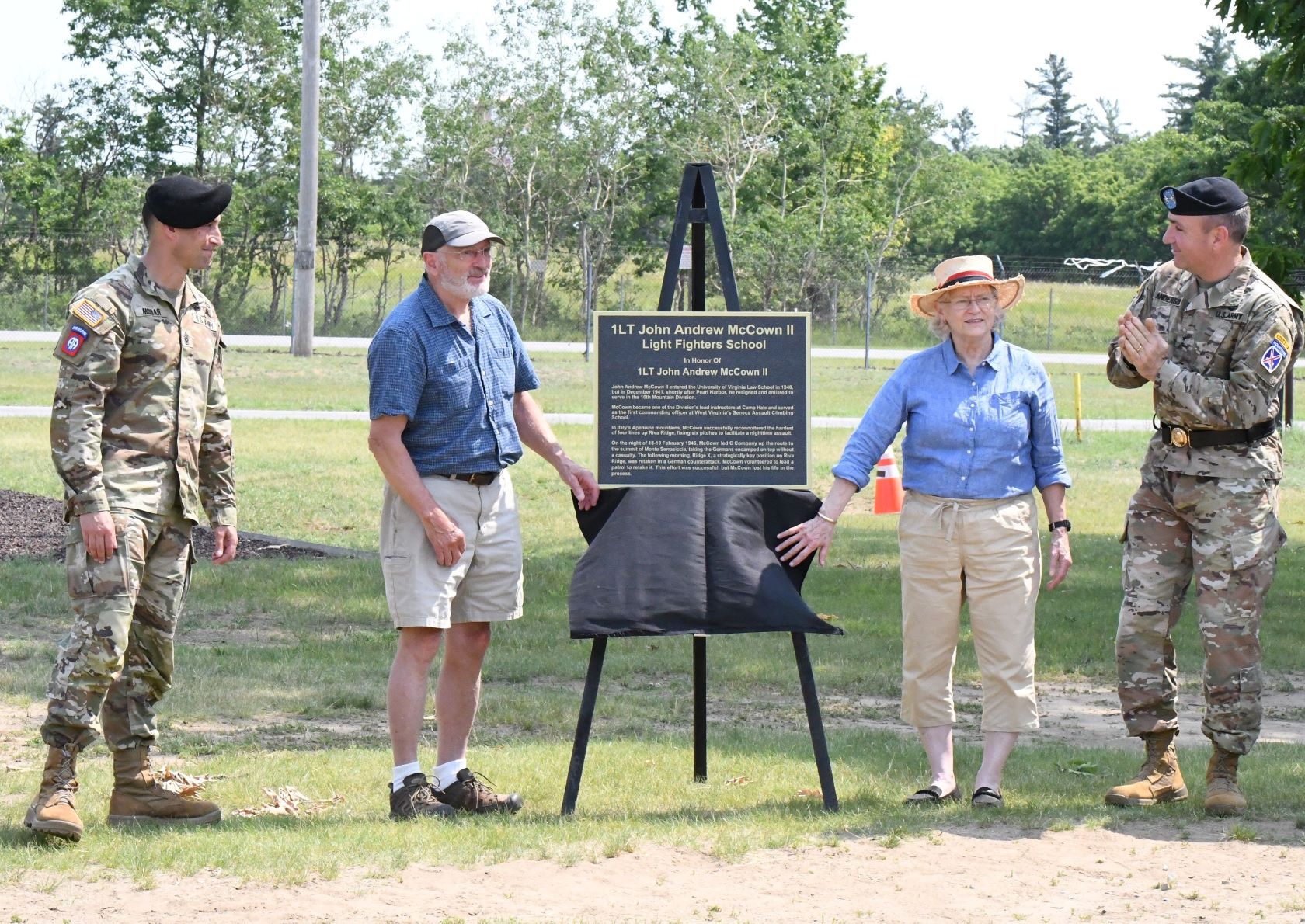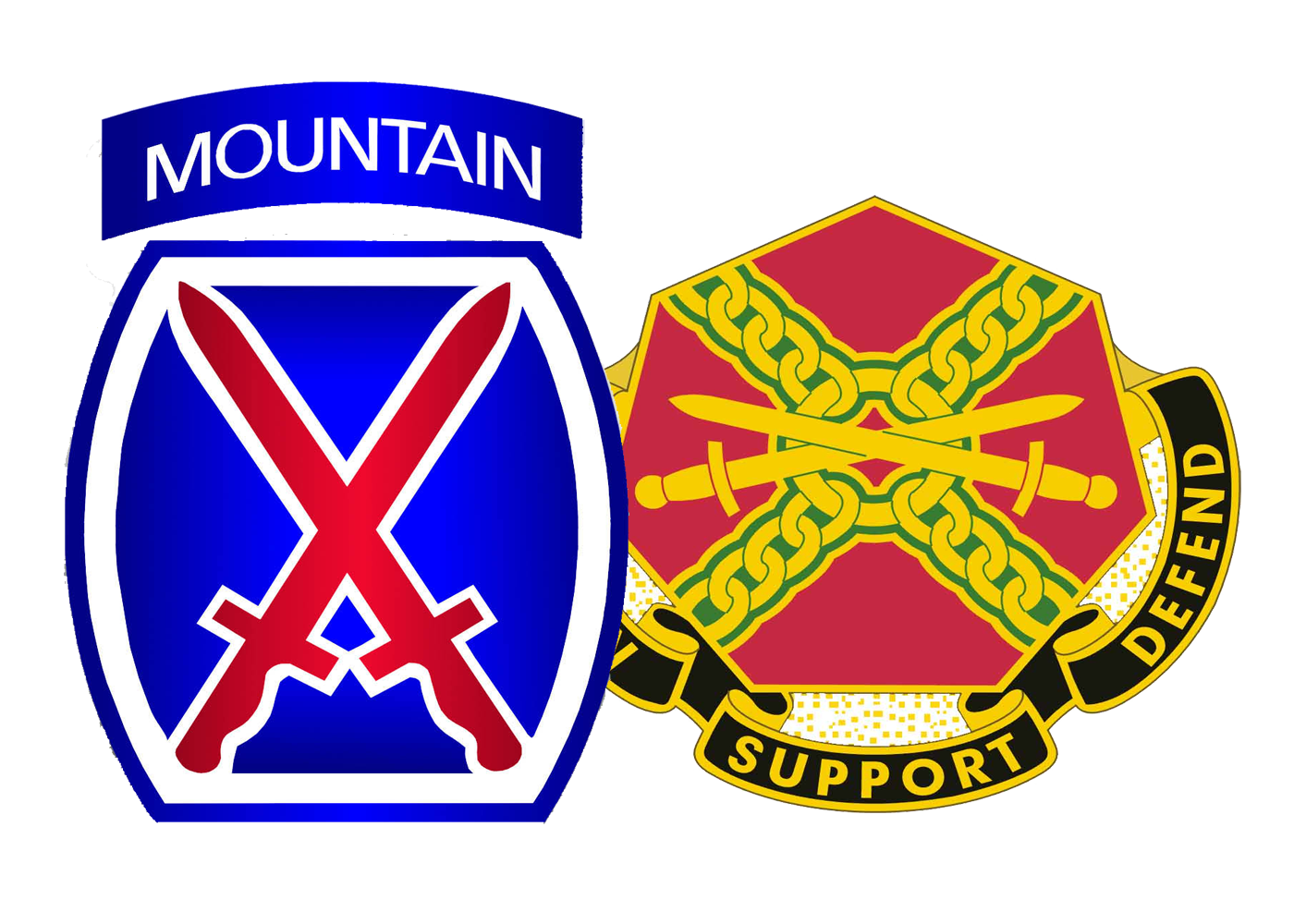

Above left: Maj. Gen. Gregory Anderson, right, 10th Mountain Division (LI) and Fort Drum commander, and Command Sgt. Maj. Nema Mobarakzadeh, 10th Mountain Division (LI) and Fort Drum senior enlisted adviser, join John and Sue McCown in the unveiling the 1st Lt. John McCown II Light Fighters School plaque during the dedication ceremony June 21 at Fort Drum. (Photo by Mike Strasser, Fort Drum Garrison Public Affairs) Above right: The Light Fighters School at Fort Drum was memorialized in honor of a World War II Soldier who served with the 10th Mountain Division. Fort Drum Soldiers and community members gathered for the ceremony outside the training facility to learn about the service and heroism of 1st Lt. John Andrew McCown II. (Photo by Sgt. 1st Class Neysa Canfield, 10th Mountain Division Sustainment Brigade)
Fort Drum’s Light Fighters School dedicated
to honor 10th Mountain Division WWII hero
Mike Strasser
Fort Drum Garrison Public Affairs
FORT DRUM, N.Y. (June 21, 2023) – First Lt. John Andrew McCown II was the type of Soldier who exemplified courage under fire by putting himself in harm’s way to save others. He was an original 10th Mountain Division Soldier who first instructed Soldiers in rock climbing before he led them in Italy’s Apennine Mountains during World War II.
With the memorialization of the 1st Lt. John A. McCown II Light Fighters School on June 21, he joins other celebrated heroes such as Magrath, Monti, and Hays whose names are honored on prominent Fort Drum buildings.
Maj. Gen. Gregory Anderson, 10th Mountain Division (LI) and Fort Drum commander, spoke about why McCown and the 10th Mountain Division’s premiere training center were the perfect match.
“His story, his life, and his service to the 10th Mountain Division is just incredible,” he said. “And it is worth memorializing toward our engine that will develop our NCOs and mountaineers to drive our division back to Mountain and Light Infantry operational excellence beginning today.”
McCown was born July 4, 1918, in Washington, D.C., and he was raised in Germantown, Pennsylvania, with his three younger brothers. They grew up hunting, fishing, hiking – and skiing, during winter breaks from school.
McCown played varsity football and lacrosse while attending the University of Pennsylvania’s Wharton School of Finance and Commerce. An avid skier, falconer, and Teton climber, he was inducted into the American Alpine Club (AAC) in 1940.
Following graduation, McCown entered the University of Virginia Law School but then made other plans after the Pearl Harbor attack on American troops in the Pacific.
With recommendations from the National Ski Association and the AAC, McCown enlisted with the newly formed mountain troops. First assigned to the 87th Mountain Infantry at Fort Lewis, Washington, he achieved the rank of corporal and graduated from Infantry School at Fort Benning, Georgia, in December 1942.
McCown rejoined his troops at Camp Hale, Colorado, after being promoted to first lieutenant. He became one of the division’s lead instructors in the Mountain Training Group, later becoming the commanding officer at the assault climbing school at Seneca Rock, West Virginia.
As an experienced climber, McCown prepared 10th Mountain Division Soldiers for combat in low-altitude mountainous terrain with instruction in full-scale, high-angle rock climbing. On average, he circulated 180 enlisted men and officers through courses every two weeks, culminating with two tactical night climbs and a full-scale assault demonstration before senior leaders from the War Department.
“John McCown trained thousands of Soldiers to master alpine operations – skills they would later put to use in the breaking of the Gothic Line in Northern Italy,” Anderson said.
On Dec. 11, 1944, McCown deployed with the 86th Mountain Infantry for Italy. The attack on Riva Ridge took weeks of reconnaissance to find routes up the heavily guarded peaks. This required the most skilled mountaineers to undertake dangerous patrols in the dark, under enemy observation.
The 86th Infantry was camped in the town of Lucca, practicing their technical climbing skills in a marble quarry when McCown joined a platoon tasked with patrolling two established trails leading to the summit of Mount Serrasiccia. He discovered a third trail over rough terrain that would initially be used for supply and evacuation operations. The final assault plan would require the 86th Infantry’s 1st Battalion to attack Riva Ridge using five different trails.
McCown and C Company would climb Trail No. 3 to take Ridge X, which would serve as an ideal observation post for the attack on della Torraccia and Mount Belvedere and as a defensive position against counterattacks on the ridgeline.
“McCown’s first and, sadly, last major battle occurred at Riva Ridge – an escarpment so precipitous, the Germans barely defended it because they considered it impossible for a company of Soldiers to climb,” Anderson said. “They hadn’t bargained for the profanity-laced tenacity of the bow-legged McCown, who had reconnoitered the hardest route of the summit and then led his C Company up that route in the cover of darkness in the dead of winter to take Riva Ridge without casualty.”
After two days of fighting to secure Riva Ridge, McCown volunteered to lead a patrol to retake a forward position along Ridge X that drove the company off the ridge, except for four Soldiers who became isolated during the counterattack.
According to his Silver Star award citation, McCown and his men were “ambushed by a superior force, whose initial burst of fire killed two men and forced all to take cover.” Crawling to a position where he could observe the enemy, McCown directed the fire of his patrol on the hostile forces, even when wounded by machine gun bullets. He was fatally struck by enemy fire when he raised up to see that his instructions were understood.
“But it was his fighting spirit, resolve and tenacity, and physical dominance like this that ultimately broke the German defenses, and Riva Ridge fell back into the 10th Mountain Division’s hands,” Anderson said.
Anderson said that the example McCown set in that battle matters to the 10th Mountain Division today.
“First Lt. John McCown is one of our great Mountain forebearers,” he said. “He was a climber and mountaineer, a trainer, an officer, and a warrior. He embodies the type of Soldier and leader we seek to train and develop in our present-day formation – to take us to the next mountain and to become the Army leaders in mountaineering, alpine, cold-weather operations, and world-class light infantry.”
Anderson said the Soldiers who enter the Light Fighters School and graduate from its courses will emulate the characteristics that made McCown a hero to this country.
“Tough, fit, skilled, courageous, and able to train others to climb and succeed in the mountains or wherever our division is called,” he said. “This is what it means to be a Mountain Soldier. John McCown, thank you for your willingness to build the Mountain Division and to fight with valor. We are all proud to dedicate our division’s Light Fighters School to you and your great acts of service.”
In his remarks, Anderson thanked Christian Beckwith, whose podcast is documenting the origin of the 10th Mountain Division, for providing insight and context into McCown’s story. Beckwith attended the ceremony and sat with the McCown family.
“On one level, it was surreal for me to have stumbled onto John’s story, and it has been an honor to be a part of this process of telling the 10th Mountain story,” Beckwith said.
The Ninety-Pound Rucksack podcast recounts division history from the perspective of the climbers, skiers and military leaders who helped form it. But Beckwith said he was struck by McCown’s story.
“I’ve been inspired by his example as a human and his boldness as a climber,” he said. “To see this Light Fighters School being named after him is just very emotional.”
John and Sue McCown expressed gratitude for the dedication of the training center to their late uncle.
“This is a great honor for the whole family, especially his mother and father who are no longer alive, just to know that he is not forgotten,” John McCown said. “Losing a son in war is never easy, and just to know that all these years later he has become an inspiration to others – a whole new generation of Soldiers in the 10th Mountain Division – is amazing. I am so honored and touched by it.”





